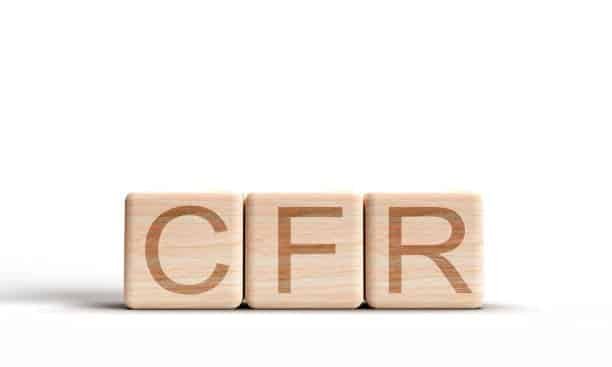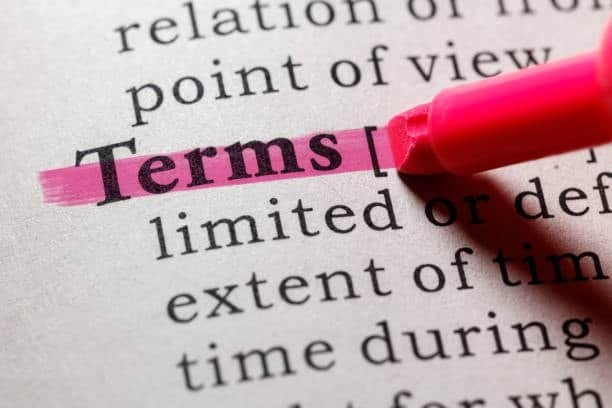In international trade and shipping, terms such as Cost and Freight (CFR) are among the most frequently used Incoterms, also known as the cfr incoterm . They spell out the vital functions of each side in global commerce such as deciding who pays what, when risks are transferred, and when the buyer assumes responsibility for the goods. For businesses that deal in international trade, learning CFR terms is important since they affect shipping, insurance and liability.
With today’s world being so interconnected, having a good understanding of CFR terms and the risk transfer point is the key to having successful and profitable international business dealings. For anyone starting or continuing in international business, becoming knowledgeable about these terms can help you get create good deals and watch out for typical difficulties in these deals, especially concerning the shipping vessel used .
What Are CFR Terms and Why They Matter in International Trade

CFR is another term for Cost and Freight which the International Chamber of Commerce has added to its International Commercial Terms (Incoterms). Under these terms, the seller organizes and pays for shipping the goods to the named destination port which involves loading them onto the vessel and covering the costs to deliver them there.
CFR terms are extremely important in the world of international trade. They set clear rules that make trade deals less ambiguous and ensure both sides are aware of what they have to do. Compared to FOB, CFR enables sellers to decide on carriers and handle the shipment and buyers are assured that their goods are delivered to the favored port without them worrying about organizing logistics until the cost transfer point .
CFR terms play an important role in sea trading because goods are often moved in high volume by ships. Clear roles are set for handling paperwork, customs approval where the goods start, export formalities, and shipment of goods. Because partners understand the rules well, business ties between nations in trade are healthier.
Key Components and Structure of CFR Incoterms
There are important elements in CFR terms that determine what the buyers and sellers must do. Among other things, the seller must hand over the goods to the carrier at the port, get all the required export documentation, manage the shipping process pay for shipping to the purchase location and give necessary documents to the buyer.
With CFR terms, the goods are passed over the ship’s rail at the port of shipment. Understanding this is necessary since it tells you when risk changes from the seller to the buyer, particularly at the final destination . The seller ought to give a commercial invoice, transport documents and anything else indicated in the contract or typical for the trade.
CFR terms are only for use in shipping from the shore to the shore, so they cannot be applied to air, road or rail transport. Since the named port is a location sellers should carefully write in their quotes and sales contracts. Because the terms are specific, both the buyer and seller agree on where the seller is responsible for payment and clarify which party responsible for risks during transi .
Seller Responsibilities Under CFR Terms Explained

Handing over the product is not the end of a seller’s obligations under CFR, because other role requirements are set. It is the seller’s job to provide the goods to the shipping company at the departure port, ensuring they are ready for ocean freight while meeting all the contract standards with regard to quality, numbers, packaging, and pre shipment inspection. Proper methods of packing for shipping by sea and ensuring labels meet all necessary rules must be done.
Sellers must also handle export procedures properly. Sellers have to get any permit, license or clearance the origin country requires prior to shipping goods internationally. Businesses also have to manage export customs which involves filing papers and covering export fees and taxes. Taking care of this responsibility safeguards that goods can be legally sent out of the country, in accordance with foreign trade contracts .
Responsibility to arrange freight and cover its costs represents the main financial task for sellers working under CFR terms. A carrier contract should be signed by the seller, fees for the freight shipped to the port are to be paid and checking that goods are loaded carefully is necessary. They are still responsible for getting goods to the named destination, but the risk changes over when the goods clear the ship at the port of shipment.
Buyer Responsibilities and Obligations in CFR Agreements
Freight arranging falls to the seller when using CFR terms, but buyers become responsible after shipment. The main duty of a buyer is to receive the goods at the destination port and handle the import steps, while the seller pays for the shipping cost . This means getting the required import license, paying the custom duties and going through any inspection or certification when the goods arrive.
Buying requires receivers to know the important process of import clearance in local regulations. Anyone buying goods should be aware of the tariff categories, the rates, and if there are additional costs or requirements for their product, especially when risk transfers occur. They have to set up customs brokers as needed and make sure all the necessary documents are sent so nothing is delayed or charged a penalty.
It is important for buyers to manage risks under CFR since the goods and all the risks they include pass over to the buyer when they are loaded onto the ship at the origin port. Buying marine insurance gives buyers added security against damages to their goods during shipment, and they may want to consider purchase insurance as well . Sellers may not insurance the goods which exposes the buyers to risks because they have nothing covering the shipment.
Risk Transfer and Insurance Considerations in CFR Terms
Many traders who are new to CFR are often unsure because risk transfer happens at a particular moment. Passing of risk changes from the seller to the buyer as soon as the goods are placed onto the ship at the port of shipment, not when the vessel arrives at the final port. So, the buyer is liable for loss or damage for the whole journey, even though the seller is responsible for the freight costs and cost transfer occurs at a specific point .
Because trucking companies request payment upfront, the buyers assume all the risks during transit. Both the employer and employee should understand this to properly handle their insurance and consider bulk cargo inland waterway transport when deciding on appropriate coverages. A key trait of CFR terms is that payment responsibility does not always go with risk assumption.
Since risks are transferred early under CFR, insurance becomes very important. Even though sellers are not expected to give insurance, it is wise for buyers to buy comprehensive marine insurance, especially when considering insurance and freight cif . The insurance needs to be for the full cost of the cargo plus a part for profit, helping to keep the goods secure from beginning to end of the sea journey.
CFR vs Other Incoterms: Key Differences and When to Use Each
Taking a look at CFR terms against others helps traders decide the best Incoterms for their business situation. CFR stands out from FOB by making the seller responsible for freight and providing direct access to shipping resources . Because of this difference, you might not have control over how and when goods are sent.
CIF (Cost, Insurance and Freight) provides insurance, while CFR (Cost and Freight) does not. While CIF and FOB both require sellers to pay freight, with CIF sellers must also ensure the buyer has a basic level of insurance protection. Sellers are not required by CFR to get insurance for the main carriage ; buyers can choose to get their own cover.
Terms like CFR are suited for buyers needing cargo at the port but managing insurance themselves. They are suitable for pro imports who have strong partnerships with insurance companies and want to manage the terms themselves. When sellers use efficient shipping networks and get low freight costs associated with freight shipping , as highlighted by trade finance global CFR becomes favorable.
Documentation Requirements for CFR Transactions
CRF transactions need careful attention to details in the documentation from every involved party to succeed. For evidence, the seller must provide a clean bill of lading or any transport document that tells about the agreement and that the goods seem to be in good condition. This is the proof that goods have been delivered according to CFR.
For customs clearance and bill payment, the information on a commercial invoice about goods, quantities and prices should be accurate and clear. The export documentation must have any certificates of origin, export licenses and compliance certificates demanded by the exporting country or the sales contract.
People who import goods will use these documents to go through customs and start any necessary insurance claims. All the paperwork should be reviewed by sellers to prevent anything from being left out before the goods are shipped. Electronic documents are now more commonly accepted, but parties need to confirm with the authorities and banks before they use them.
Common Mistakes and How to Avoid Them in CFR Deals
Many times, people who use CFR not clearly understand when inventory risk changes from seller to buyer. People are often unaware that their travel insurance will cover risks only after leaving the country which can result in poor or incomplete insurance and many conflicts over claims. Goods are considered delivered at the origin port and all risks to them are passed to the receivers once they cross the ship’s rail, irrespective of freight payment.
A major challenge is often lacking the proper amount of insurance. Buyers often do not remember to ask for insurance since CFR terms do not force sellers to supply it which may result in buyers having less or no coverage. The total cost of marine insurance coverage should be CIF costs plus a fair margin for the potential risk of profits and fees.
Problems in CFR transaction paperwork normally lead to delays and extra costs. The seller should make sure all documents are ready before shipping out goods and buyers ought to confirm they have all the needed import licenses. Clearly defined ways to communicate and check documents makes it hard for these mistakes to happen.
Best Practices for Negotiating CFR Terms Successfully
To succeed in CFR negotiations, both sides must address matters apart from just the cost and delivery of goods. Before agreeing to CFR terms, it is important for sellers to assess if they can handle the shipping and if their network is strong enough to get products to the selected destination port. An assessment needs to be done on how predictable the freight rates are and the quality of relationships with carriers buyer’s risk.
Buyers ought to look into what the destination port can do and if there are any restrictions for clearing goods. Being aware of customs rules, possible delays and extra fees enables buyers to plan their budgets and expect what will happen when their goods arrive.
Being specific about where the cargo will be unloaded is very important to prevent disagreements and extra expenses. It is important for parties to decide on the official port name, together with any special terminals or facilities inside the port area. Being detailed stops confusion and helps sellers give correct freight quotes and arrange the right way to ship goods.
Future Trends and Developments in CFR Terms Usage
The progress of international trade standards often shapes the way people handle and apply CFR rules now import formalities. Digital changes in shipping and logistics are making document handling more efficient and allowing for handling CFR transactions faster using electronic bills of lading and automated customs systems freight prepaid. With these technological developments, processing is faster and errors are less common in CFR transactions affordable insurance.
Since companies are focusing on cutting carbon emissions, environmental points are now a bigger part of CFR deal talks. People handling freight using CFR terms are promoting eco-friendly ways to ship, considering environmental aspects and adhering to incoterms rules that might lead to changing routes and using greener fuels which can change overall delivery prices and schedules agreed upon destination port. People are considering the environmental aspects when picking their shipping terms all the costs.
The use of digital trade and blockchain is meant to boost openness and safety in CFR deals. Using smart contracts, many processes in CFR agreements might be automated, like starting insurance and checking paperwork. With these innovations, parties could use new approaches to deal with risks and fulfill regulations in CFR deals seller arranges.
Conclusion
CFR terms are important in global trade because they provide a balanced method for handling shipping tasks which helps both parties involved when understood and handled correctly carriage paid. A successful CFR transaction depends on knowing that sellers cover the freight expenses related to transporting goods , while the risks are transferred to buyers as soon as the goods are shipped and they are responsible for getting the proper insurance obtain insurance. Applying this basic understanding, accurate documentation and clear language in trades, helps traders work with CFR terms in their international affairs.


Thank you for reading!
Have questions, corrections, or better ideas? We’d love to hear from you!
We value every piece of feedback and promise to reply within 24 hours. Let's make this guide better together!
Note: Spam comments will not be published.